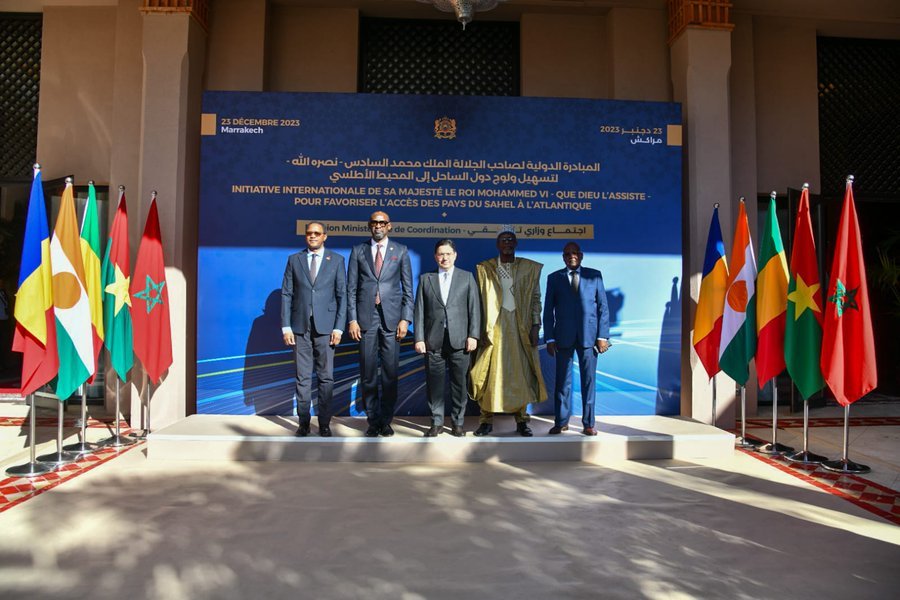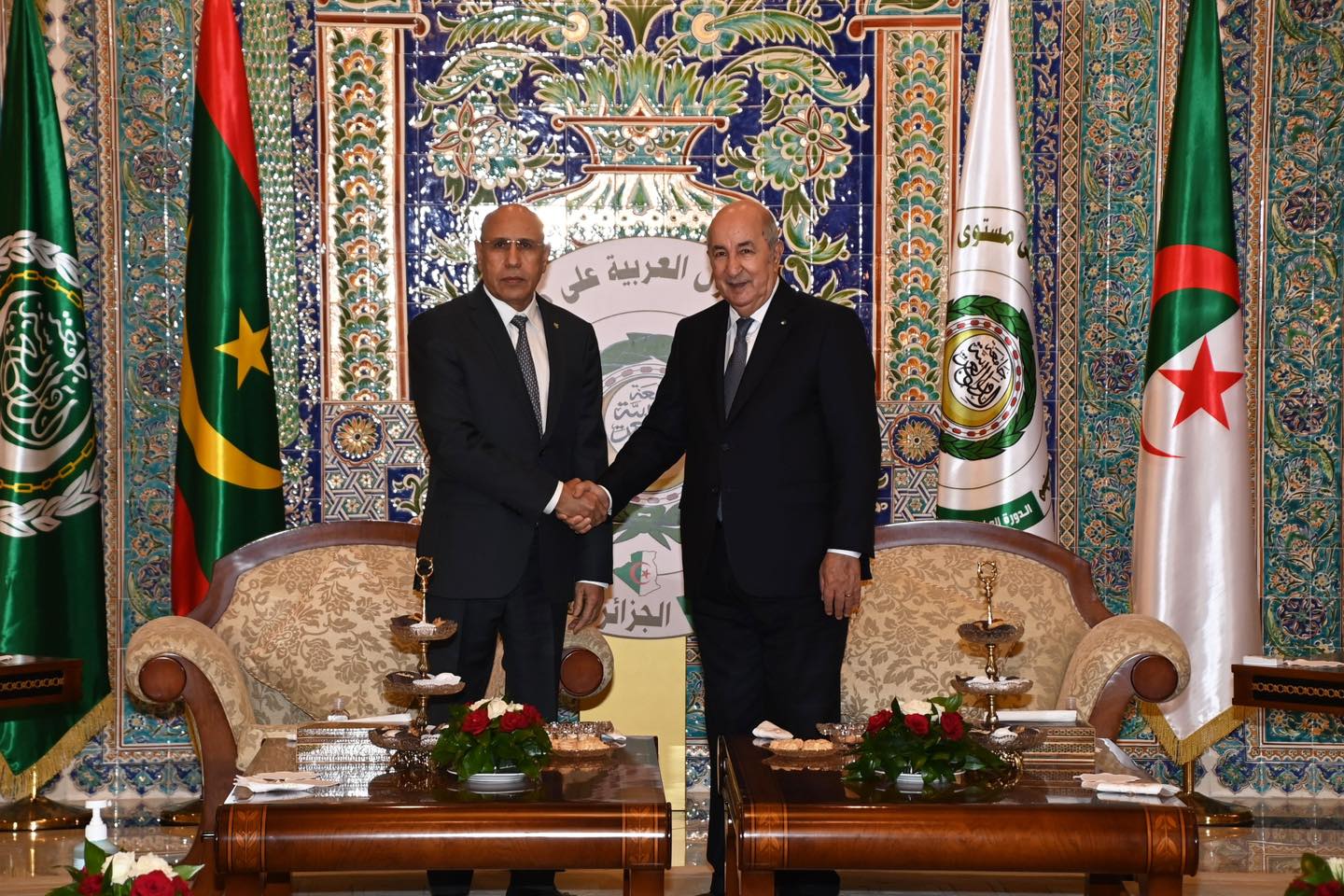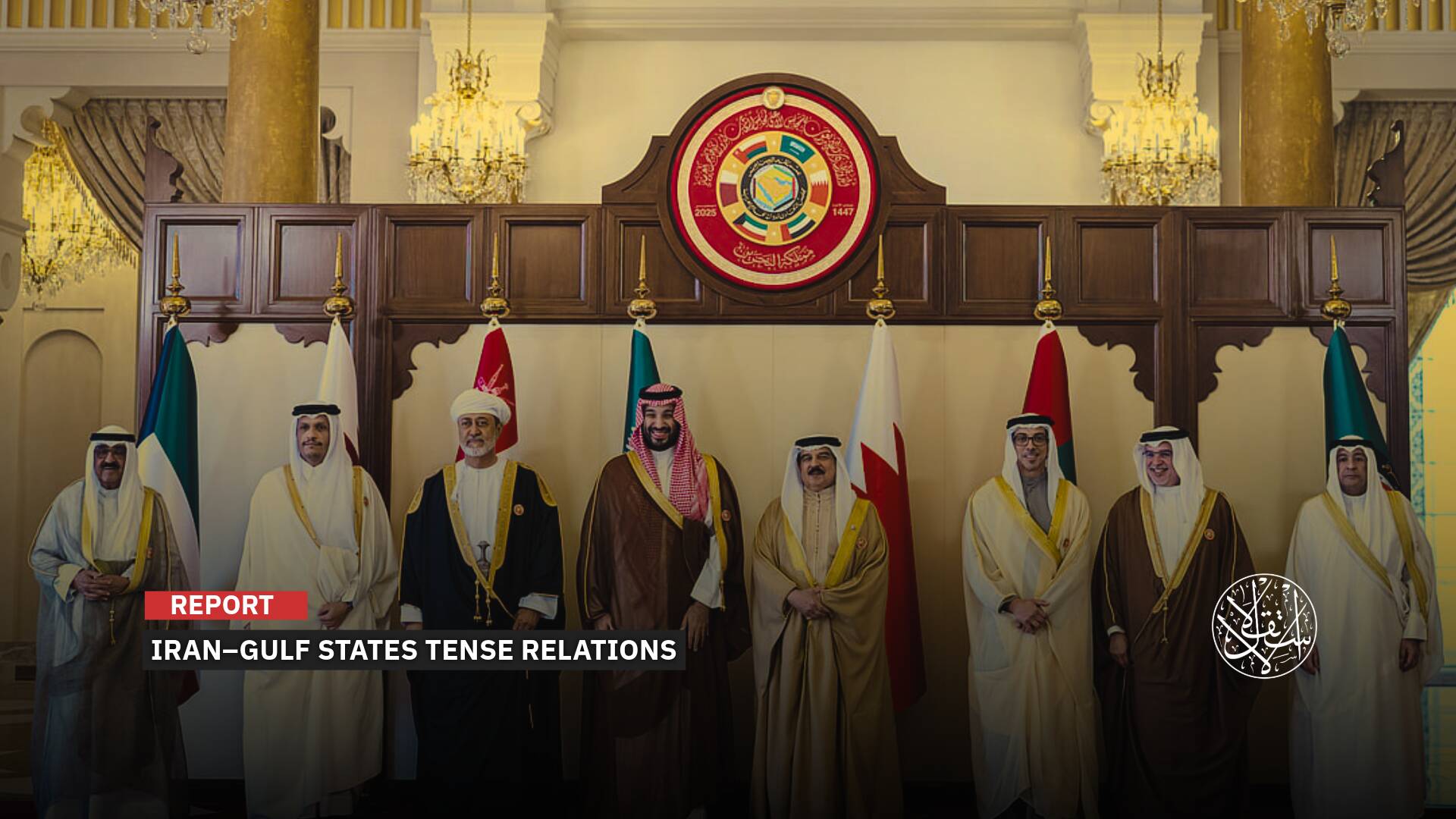Mauritania, Morocco Forge Strategic Alliances Amid Regional Shifts

Ould Ghazouani's visit to Morocco represents a qualitative shift.
Amid warm receptions from both Moroccan and Mauritanian officials, representatives from the two countries expressed their satisfaction with Nouakchott's decision to engage in the “strategic projects” spearheaded by Morocco, in partnership with several African nations.
This development followed a meeting between King Mohammed VI of Morocco and Mauritanian President Mohamed Ould Cheikh El Ghazouani, with a statement from the royal palace affirming that “the strong relations of trust and cooperation between the two countries and the sincere brotherly ties uniting the two fraternal peoples.”
Strategic Projects
“During their talks, the two leaders expressed satisfaction with the positive development of the Morocco-Mauritania partnership across various sectors,” Morocco World News reported.
“They also expressed their shared commitment to enhancing strategic projects that connect their neighboring countries.”
“The two heads of state reaffirmed their determination to collaborate on major royal initiatives in Africa. This includes the African-Atlantic Gas Pipeline and efforts to improve access for Sahel countries to the Atlantic Ocean.”
In response, a statement from the Mauritanian presidency noted that the two leaders discussed ways to enhance their ties through new projects designed to foster greater exchange and integration between the nations.
The Mauritanian presidency further highlighted that the meeting, held at the royal palace in Casablanca, took place in a cordial atmosphere, reflecting the depth and strength of the fraternal relations between the two peoples, their countries, and their leaders.
President Ghazouani arrived in Morocco on December 18 to monitor the health condition of his wife, Mariem bint Dah.
Notably, Morocco plans to launch tenders in 2025 for the construction of the first phases of a gas pipeline project with Nigeria, according to the 2025 Action Plan document from Morocco’s National Office of Hydrocarbons and Mines (ONHYM).
The ambitious project, which is set to involve 16 African countries, most of them along the Atlantic coast, will stretch from Nigeria to Morocco.
It will be linked to the Moroccan-European gas pipeline and the broader European gas network, with a projected maximum capacity of 30 billion cubic meters of gas annually.
The tenders will focus on the sections located within Moroccan territory.
First announced in 2016 during a visit by King Mohammed VI to Abuja, the project was later formalized in meetings with then-President Muhammadu Buhari.
The initiative received financial backing for preliminary studies from the Islamic Development Bank and the OPEC Fund for International Development.
Regarding Morocco’s other major regional initiative, the Atlantic Access for the Sahel project, the kingdom describes it as “strategic and promising.”
The initiative aims to provide the Sahel countries—Mali, Niger, Burkina Faso, and Chad—with direct access to the Atlantic Ocean, enabling them to better market their products and achieve sustainable development for their populations.
On December 23, 2023, ministers from the Sahel countries met in Marrakech, Morocco, agreeing to create a national working group in each country tasked with preparing and proposing ways to activate the initiative.

A Pivotal Step
Academic researcher Bilal al-Talidi argues that "following the royal reception of Mauritanian President Mohamed Ould Ghazouani and his reaffirmation of his country's coordination with Morocco on the gas pipeline project and the Atlantic initiative, the notion that Mauritania poses a stumbling block to Morocco's strategic ambitions in Africa has been entirely debunked."
Al-Talidi told Al-Estiklal that when Morocco first announced the Nigerian-Moroccan gas pipeline project, it faced opposition based on four main arguments.
These included the high cost of the project, given its passage through 13 West African countries, its technical complexity, the difficulty in securing funding, and the security challenges.
Some critics even raised concerns about Mauritania's commitment to the project.
The critics championed the Algerian alternative, citing its lower cost, shorter distance (as it would only pass through Niger), and its lack of reliance on Mauritania.
"When King Mohammed VI announced the Atlantic Initiative in November 2023 to provide Sahel countries with direct access to the Atlantic, there was opposition claiming the initiative had no future without Mauritania, as the latter would not accept a situation where Morocco's regional power was strengthened at Mauritania's expense," al-Talidi noted.
The academic researcher emphasized that after the coup in Niger and the escalating tensions between Algeria and Niger, the Algerian-Nigerian gas pipeline project collapsed.
The only viable option remaining on the table was the Nigerian-Moroccan pipeline.
Al-Talidi noted that Algeria now faces an unprecedented dilemma: Mauritania, the only secure region along Algeria’s borders, has chosen to coordinate with Morocco.
This has effectively undermined all of Algeria’s regional strategies, including its vision of a "Maghreb without Morocco."
Algeria, al-Talidi argues, must now reconsider its approach, renew dialogue, and act swiftly before it’s too late.
Meanwhile, Algerian opposition figure Walid Kabir stated that his government is deeply frustrated with President Ould Ghazouani.
Kabir believes that Morocco’s decision to treat the Mauritanian first lady's medical condition was merely a cover for the president's significant visit, which included a reception by King Mohammed VI at the royal palace in Casablanca.
Walid Kabir, an Algerian opposition figure, told Al-Estiklal that Mauritanian President Mohamed Ould Ghazouani clearly expressed to King Mohammed VI his country’s intention to strengthen the "strategic partnership" with Morocco.
Kabir pointed out that this declaration came as a shock to the Algerian leadership, particularly as President Abdelmadjid Tebboune had recently visited Nouakchott, suggesting a lack of awareness of the depth of Mauritania’s ties with Morocco.
Kabir explained that the Algerian regime had tried to sway Mauritania by offering alternative proposals, including the creation of a free trade zone at the border and the construction of the Tindouf-Zouerate road, all in exchange for cutting ties with Morocco. However, these efforts, he argued, had failed.
The political activist and media figure emphasized that Mauritania had made five clear refusals to Algeria: no to closing the Guerguerat border crossing with Morocco, no to any regional bloc excluding Rabat, no to opposing the African Atlantic Gas Pipeline project, no to rejecting Morocco’s initiative to facilitate Sahel countries' access to the Atlantic Ocean, and no to opening a Polisario embassy in Nouakchott.
Kabir further noted that Algeria now finds itself in a serious predicament, as nearly all of its neighbors (with the exception of Tunisia) have refused to engage in its failed efforts to isolate Morocco regionally.
He urged Algeria to adapt to recent developments and seek viable solutions to extricate itself from this dilemma, stressing that maintaining the current stance would only lead to further mistakes.
According to Al-Estiklal, in his analysis of the event, Ahmed Ould Abid, the Deputy Leader of the Mauritanian 'Al-Sawab' Party, noted that while President Ould Ghazouani's visit to Morocco was primarily personal, aimed at attending to the health of Mauritania's First Lady, Mariem bint Dah, it also carried significant political and diplomatic symbolism.
He pointed out that the visit occurred within the context of the deep historical, cultural, and social ties between Morocco and Mauritania, as well as the long-standing brotherly relations between the two countries’ leaderships.
Ould Abid, a prominent figure in Mauritania's opposition, argued that the visit had far-reaching implications beyond the typical results of official visits.
“This visit provided a substantial boost to key strategic projects, including the Nigerian-Moroccan gas pipeline, which he described as a vital economic artery extending across the African continent, as well as the initiative to facilitate Sahel countries’ access to the Atlantic.”
“Mauritania’s involvement in these projects was a clear indication of a shared vision between the two countries to enhance regional integration and sustainable development, marking these efforts as the foundation for a more robust partnership in the future.”
“The visit was not just a reaffirmation of bilateral ties but represented a qualitative shift with the potential for profound impact on the broader Morocco-Mauritania relationship,” Ould Abid concluded.

Ghazouani as a Mediator
Some analysts and observers have speculated about other underlying reasons for President Mohamed Ould Ghazouani’s visit, particularly his potential role as a mediator between Morocco and Algeria.
In this regard, Mauritanian journalist Channouf Malokif suggested that, given Ghazouani’s strong relationships with both King Mohammed VI of Morocco and President Abdelmadjid Tebboune of Algeria, he could play a constructive and positive role in improving ties between the two North African neighbors.
"The first step in this regard could be an effort to restore diplomatic relations and reopen borders and airspace between the two countries," Malokif posted on Facebook.
"I believe that Ghazouani’s calm yet effective diplomacy has the right ingredients for success in such efforts," he continued.
Political analyst Mohamed Chakir suggested that Mauritanian President Mohamed Ould Ghazouani may have brought proposals for mediation between Morocco and Algeria, aimed at alleviating the tensions between the two countries.
According to Al-Estiklal, Chakir stated that, especially amid talks of a potential Maghreb reconciliation, it is likely that Algeria has tasked President Ghazouani with exploring solutions to the ongoing disputes with Morocco.
"This comes at a time when Algeria is facing significant diplomatic isolation, particularly following France's recognition of Morocco’s sovereignty over Western Sahara, which triggered severe repercussions, the latest being Algeria recalling its ambassador from Paris."
"Mauritania is keen to maintain a delicate balance in its relations with both Morocco and Algeria, especially after the controversy surrounding President Tebboune’s recent visit to Mauritania, which some viewed as an attempt by Algeria to draw Mauritania into a trilateral alliance with Tunisia, Algeria, and Libya."
According to Chakir, "What strengthens this theory is that during Tebboune's visit, Mauritania had sent its parliamentary president, Mohamed Ould Mokkedh, on an official mission to Morocco, reflecting the country’s ongoing efforts to preserve this diplomatic equilibrium."
University professor and political analyst Mohamed Nashtawi, meanwhile, noted that while the visit appeared to be of a private nature, it likely carried several diplomatic tasks.
"The most significant of these, in my view, could be a potential mediation between Morocco and Algeria, especially since only a few days had passed since President Ould Ghazouani hosted his Algerian counterpart in Mauritania," Nashtawi told Al-Estiklal.
"The current geo-strategic context, including the return of Donald Trump to power, developments in Syria, and Russia's waning influence in the Middle East, suggests that Algeria is seeking to end its diplomatic isolation. And it seems that the road out of this isolation begins with Morocco," Nashtawi noted.
"President Ould Ghazouani may be carrying a proposal for mediation, potentially at Algeria’s request," though Nashtawi noted that the details of such efforts remain under wraps for now.
Similarly, academic and international relations expert Lahcen Akratit did not rule out Mauritania’s role in easing tensions between Morocco and its eastern neighbor.
Speaking to Hespress on December 22, Akratit stated, "Mediation is indeed possible in this context, despite the absence of a formal framework for the visit, with no political agenda publicly outlined."
"However, it can be said that this is no ordinary visit; it aims to rebuild new channels of communication between Nouakchott and Rabat."
"The visit sends a political signal, indicating Mauritania’s desire to maintain a balance in its relations with both Morocco and Algeria, especially following President Tebboune’s recent visit," Akratit said.
Sources
- Royal Palace Statement [Arabic]
- Chikir: Ghazouani’s Visit to Morocco Goes Beyond the Personal, Could Involve Mediation with Algeria [Arabic]
- King Mohammed VI’s Meeting with President Ghazouani Sends Positive Maghreb Messages [Arabic]
- The Mauritanian "Sawab" Party: Ghazouani’s Private Visit Achieved What Official Diplomatic Visits Could Not [Arabic]
- King Mohammed VI Receives Mauritanian President in Casablanca to Strengthen Bilateral Ties








